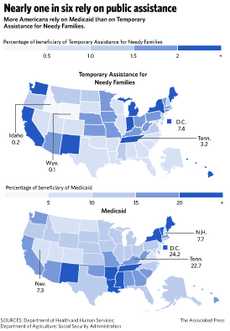Reforms fail to limit welfare

ME Online
Feb 26, 2007
Last updated on May 12, 2016 at 08:21 a.m.
WASHINGTON – The welfare state is bigger than ever despite a decade of policies designed to wean poor people from public aid.
The number of families receiving cash benefits from welfare has plummeted since the government imposed time limits on the payments a decade ago. But other programs for the poor, including Medicaid, food stamps and disability benefits, are bursting with new enrollees.
The result, according to an Associated Press analysis: Nearly one in six people rely on some form of public assistance, a larger share than at any time since the government started measuring two decades ago.
Critics of the welfare overhaul say the numbers offer fresh evidence that few former recipients have become self-sufficient, even though millions have moved from welfare to work. They say the vast majority have been forced into low-paying jobs without benefits and few opportunities to advance.
Get The Daily Illini in your inbox!
“If the goal of welfare reform was to get people off the welfare rolls, bravo,” said Vivyan Adair, a former welfare recipient who is now an assistant professor of women’s studies at Hamilton College in upstate New York. “If the goal was to reduce poverty and give people economic and job stability, it was not a success.”
Proponents of the changes in welfare say programs that once discouraged work now offer support to people in low-paying jobs. They point to expanded eligibility rules for food stamps and Medicaid, the health insurance program for the poor, that enable people to keep getting benefits even after they start working.
“I don’t have any problems with those programs growing, and indeed, they were intended to grow,” said Ron Haskins, a former adviser to President Bush on welfare policy.
“We’ve taken the step of getting way more people into the labor force and they have taken a huge step toward self-sufficiency. What is the other choice?” he asked.
In the early 1990s, critics contended the welfare system encouraged unemployment and promoted single-parent families. Welfare recipients, mostly single mothers, could lose benefits if they earned too much money or if they lived with the father of their children.
Major changes in welfare were enacted in 1996, requiring most recipients to work but allowing them to continue some benefits after they started jobs.
McDermott, D-Wash., said work requirements enacted last year, when Congress renewed the welfare overhaul law, will make it even more difficult for welfare recipients to get sufficient training to land good-paying jobs.





